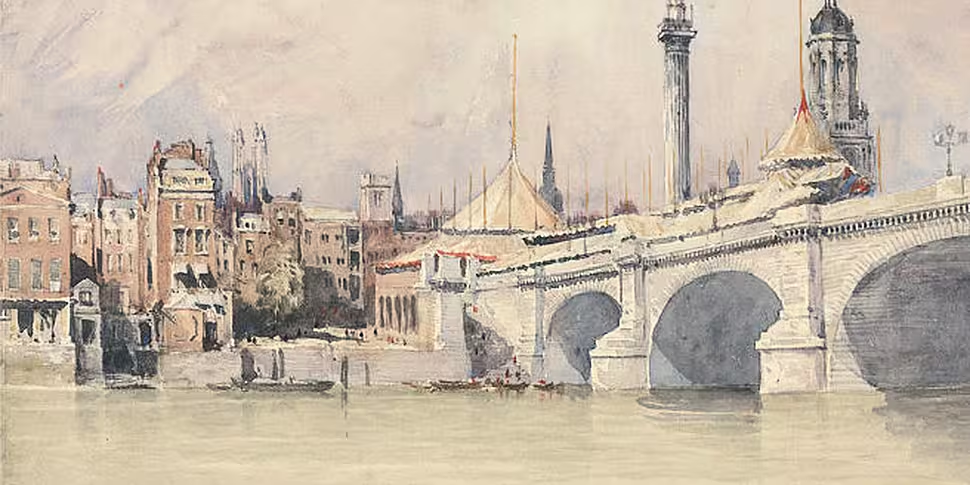The awful daring of a moment's surrender which an age of prudence
can never retract.
by this, and only this, we have existed.
-TS Elliot ‘The Waste Land’, lines 403-405
Regarded as one of the greatest poets of the 20th century TS Eliot and his literary genius are claimed by both sides of the Atlantic. A native of St Louis he spent the greater part of his young life in the ‘Gateway to the West’, penning and publishing many early poems. What lay through the gate held little appeal for Eliot though and when he graduated from school in 1905 he struck east. After a short sojourn to Massachusetts he settled in Harvard where he spent most of the next eight years studying and teaching.
These early years undoubtedly shaped TS Eliot and his poetic voice, lending weight to America and St Louis’ claim to him as an artist. Yet it wasn’t until he departed for Oxford in 1914 that Eliot began to produce the great works he is so famous for today. Quickly tiring of the pretty but boring Oxford Eliot struck out for London. Here he met the famous American literary figure Ezra Pound, fast shedding his own native identity.
This was a turning point for Eliot as Pound introduced him around London’s vibrant literary and artistic community. By the following year he had settled in the University of London and had published the first of his seminal works, ‘The Love Song of J. Alfred Prufrock’. Though Eliot had been composing this work since 1910 it was telling that it was in England that it was published; here he had found an attentive and hungry audience.
For the rest of his life TS Eliot would make England his home, joining the Anglican Church and becoming a British citizen in 1927. In 1965 he died in his home in Kensington, London. He had left behind one of the greatest catalogues of 20th century poetry, most of it composed in and inspired by his adoptive homeland. In ‘Young Eliot: From St Louis to the Waste Land’ Professor Robert Crawford traces Eliot’s journey from the New World to the Old and how his life unfolded.
Join Susan as she talks with Robert about the life and writings of TS Eliot. How did Eliot’s life shape his writing? What role did his poetic mother and philanthropic father play in forming his voice? Were his writings fuelled by a deep sorrow? And should he be considered an American or English writer?
We stay in England for the second part of this Sunday’s show as Susan talks with Peter Ackroyd about his native London and how a city can shape its inhabitants. Raised on a council estate in East Acton Peter grew up surrounded by the culture and history of this ancient city, developing a close attachment with it. Even after he left for Cambridge and Yale Peter remained inexorably tied to London; his Yale fellowship even produced an ode to his fellow ‘Londoner’ TS Eliot in the form of ‘Notes for a New Culture’.
After returning to London Peter began his literary career in earnest working at ‘The Spectator’ and ‘The Times’ while penning poetry and prose. The influence of his home city can again be seen in his first collection and novel, ‘London Lickpenny’ and ‘The Great Fire of London’. This theme continued as Peter captured the history and culture of London in more and more works of fiction and non-fiction. This talent was most clearly evident in his biographies. Focusing mainly on the great men who were shaped by and in turn helped to shape London Peter soon established himself as one of the world’s most talented biographers.
Join ‘Talking Books’ as Susan talks with Peter about his life, his city, and the art of capturing the spirit of a place or person in words. How do you write a good biography? What’s it like to try and refine another person’s life into a book? What can you learn about a place from the people who live there? Why is he so drawn to London? And how does a place shape a person’s inner vision?
Tonight's music to read to
The first part of the show is bracketed by Max Richter and Keith Kenniff, aka Golmund. Max's 'Infra 5', from his album 'Infra', kicks off the show. 'Shenandoah', from the Goldmund album 'All Will Prosper', brings us out of Robert's account of Eliot's life and 'Music for 16 Cellos' by Zoe Keating, taken from her 'Into the Trees' album, brings the whole show to a close.









